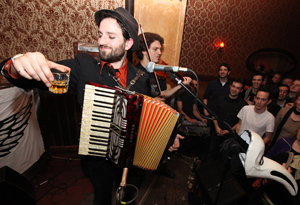There is much discussion and concern in the Jewish boardrooms, committee meetings and community about continuity and engagement. Everyone, rightfully, wants to know what it takes to keep people engaged with the Judaism. The usual suggestions tend to focus on social media and social opportunities, about open door policies and lowering entry costs.
Perhaps what we really need is more music. Well, not just music, but a full range of art and culture. We need to support the singers and writers, the painters and poets who demonstrate that Jewish faith and traditions are rich sources of inspiration for exceptional artistry. We need to support Jewish artists and increase awareness and exposure to them among the entire Jewish community.
Why? Just how important are the arts to Jewish peoplehood at this time? They are essential and have been from the very beginning, from when the angels sang, yes sang, in celebration of the creation of the world. From Miriam’s timbrel to Matisyahu concerts, music is a part of us. And, with the demise of radio stations and record labels, if we want to ensure people get to experience great Jewish art, we, as a community, must make it a priority. Yes, we need rabbis and teachers and camp directors, but we also need musicians and poets. There are important artists in all genres who are taking our traditions and reinterpreting and rejuvenating them.

Rather, I’d like to talk about what one song, “Mayn Rue Plats” (My Place To Rest), written in Yiddish by poet Morris Rosenfeld, the poet laureate of the slum and sweatshop. Now, I knew a bit about the Lower East Side sweatshops and the roles Jews played in labor rights. I even knew that there was once a thriving – though unimaginable to me – Yiddish theater world because I got to see Molly Picon with my grandmother when the show Milk and Honey came to Boston.
But back to the song. This is the last song on Daniel Kahn’s Partisans and Parasites cd. And it just moves the heck out of me. Here we have, in one song, by a dedicated and talented Klezmer/Punk/Protest/Rock singer (a Yiddish Billy Bragg perhaps?), beauty, history, and the values of Tikkun Olam. All in just 4 minutes.
I am convinced that opportunities to hear music like this, as well as all other Jewish arts, can be an irresistible invitation to inspire, expand and rejuvenate large segments of our community, especially those that mainstream Jewish institutions are having a difficult time reaching.
After seeing a great work of art, whether on stage, in a concert hall or at a museum, when I feel that unique sense of wonder and pride that I am part of the humanity that created it, I often say, “Boy, I’m glad I’m alive.” When it’s hearing a song like this, though, I tend to say, ‘Boy, I’m glad I’m a Jew.”
This post has been contributed by a third party. The opinions, facts and any media content are presented solely by the author, and JewishBoston assumes no responsibility for them. Want to add your voice to the conversation? Publish your own post here. MORE
